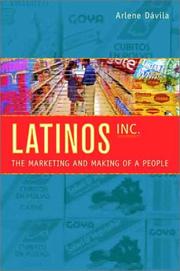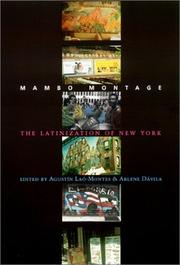| Listing 1 - 10 of 13 | << page >> |
Sort by
|
Book
ISBN: 0814744311 9780814744314 9780814744321 081474432X 081474429X 9780814744291 0814744303 9780814744307 9780814744291 Year: 2012 Publisher: New York, NY
Abstract | Keywords | Export | Availability | Bookmark
 Loading...
Loading...Choose an application
- Reference Manager
- EndNote
- RefWorks (Direct export to RefWorks)
Culture Works addresses and critiques an important dimension of the “work of culture,” an argument made by enthusiasts of creative economies that culture contributes to the GDP, employment, social cohesion, and other forms of neoliberal development. While culture does make important contributions to national and urban economies, the incentives and benefits of participating in this economy are not distributed equally, due to restructuring that neoliberal policies have wrought from the 1980's on, as well as long-standing social structures, such as racism and classism, that breed inequality. The cultural economy promises to make life better, particularly in cities, but not everyone can take advantage of it for decent jobs. Exposing and challenging the taken-for-granted assumptions around questions of space, value and mobility that are sustained by neoliberal treatments of culture, Culture Works explores some of the hierarchies of cultural workers that these engender, as they play out in a variety of settings, from shopping malls in Puerto Rico and art galleries in New York to tango tourism in Buenos Aires. Noted scholar Arlene Dávila brilliantly reveals how similar dynamics of space, value and mobility come to bear in each location, inspiring particular cultural politics that have repercussions that are both geographically specific, but also ultimately global in scope.
Latin Americans --- Neoliberalism --- Cultural industries --- Arts --- Latinxs --- Ethnology --- Arts, Fine --- Arts, Occidental --- Arts, Western --- Fine arts --- Humanities --- Creative industries --- Culture industries --- Industries --- Neo-liberalism --- Liberalism --- Social conditions. --- Economic conditions. --- Latin America --- Asociación Latinoamericana de Libre Comercio countries --- Neotropical region --- Neotropics --- New World tropics --- Spanish America --- Civilization. --- Cultural policy. --- Arts, Primitive
Book
ISBN: 0814785387 0814720064 0814720072 Year: 2008 Publisher: New York, NY : New York University Press,
Abstract | Keywords | Export | Availability | Bookmark
 Loading...
Loading...Choose an application
- Reference Manager
- EndNote
- RefWorks (Direct export to RefWorks)
Winner of the 2010 Distinguished Book Award in Latino Studies from the Latin American Studies AssociationIllegal immigrant, tax burden, job stealer. Patriot, family oriented, hard worker, model consumer. Ever since Latinos became the largest minority in the U.S. they have been caught between these wildly contrasting characterizations leaving us to wonder: Are Latinos friend or foe?Latino Spin cuts through the spin about Latinos’ supposed values, political attitudes, and impact on U.S. national identity to ask what these caricatures suggest about Latinos’ shifting place in the popular and political imaginary. Noted scholar Arlene Dávila illustrates the growing consensus among pundits, advocates, and scholars that Latinos are not a social liability, that they are moving up and contributing, and that, in fact, they are more American than “the Americans.” But what is at stake in such a sanitized and marketable representation of Latinidad? Dávila follows the spin through the realm of politics, think tanks, Latino museums, and urban planning to uncover whether they effectively challenge the growing fear over Latinos’ supposedly dreadful effect on the “integrity” of U.S. national identity. What may be some of the intended or unintended consequences of these more marketable representations in regard to current debates over immigration?With particular attention to what these representations reveal about the place and role of Latinos in the contemporary politics of race, Latino Spin highlights the realities they skew and the polarization they effect between Latinos and other minorities, and among Latinos themselves along the lines of citizenship and class. Finally, by considering Latinos in all their diversity, including their increasing financial and geographic disparities, Dávila can present alternative and more empowering representations of Latinidad to help attain true political equity and intraracial coalitions.
Hispanic Americans --- Social conditions. --- United States --- Race relations. --- Race question --- D225vila. --- Latino. --- almost. --- and. --- celebrates. --- class. --- demonizing. --- driven. --- elegantly. --- entirely. --- folks. --- immigrants. --- manufactured. --- media. --- middle. --- poor. --- recent. --- resemble. --- simultaneously. --- sleight-of-hand. --- that. --- them. --- uber-American. --- unravels. --- while.
Book
ISBN: 9780814785386 Year: 2008 Publisher: New York, NY
Abstract | Keywords | Export | Availability | Bookmark
 Loading...
Loading...Choose an application
- Reference Manager
- EndNote
- RefWorks (Direct export to RefWorks)
Digital
ISBN: 9780814744314 9780814744291 Year: 2012 Publisher: New York, N.Y. New York University Press
Abstract | Keywords | Export | Availability | Bookmark
 Loading...
Loading...Choose an application
- Reference Manager
- EndNote
- RefWorks (Direct export to RefWorks)
Digital
ISBN: 9780814785386 9780814720066 Year: 2008 Publisher: New York, N.Y. New York University Press
Abstract | Keywords | Export | Availability | Bookmark
 Loading...
Loading...Choose an application
- Reference Manager
- EndNote
- RefWorks (Direct export to RefWorks)

ISBN: 0520227247 Year: 2001 Publisher: Berkeley University of California press
Abstract | Keywords | Export | Availability | Bookmark
 Loading...
Loading...Choose an application
- Reference Manager
- EndNote
- RefWorks (Direct export to RefWorks)
Consommateurs hispaniques --- Hispanic American consumers --- Hispanic verbruikers --- Hispanic Americans --- Market segmentation --- Consumers, Hispanic American --- Hispanic Americans as consumers --- Spanish Americans as consumers --- Consumers --- Ethnic identity --- United States
Book
Abstract | Keywords | Export | Availability | Bookmark
 Loading...
Loading...Choose an application
- Reference Manager
- EndNote
- RefWorks (Direct export to RefWorks)
Book
ISBN: 9781479828913 1479828912 9781479860586 1479860581 1479848115 Year: 2014 Publisher: New York New York University Press
Abstract | Keywords | Export | Availability | Bookmark
 Loading...
Loading...Choose an application
- Reference Manager
- EndNote
- RefWorks (Direct export to RefWorks)
"Just ten years ago, discussions of Latina/o media could be safely reduced to a handful of TV channels, dominated by Univision and Telemundo. Today, dramatic changes in the global political economy have resulted in an unprecedented rise in major new media ventures for Latinos as everyone seems to want a piece of the Latina/o media market. While current scholarship on Latina/o media have mostly revolved around important issues of representation and stereotypes, this approach does not provide the entire story. In Contemporary Latina/o Media, Arlene Dávila and Yeidy M. Rivero bring together an impressive range of leading scholars to move beyond analyses of media representations, going behind the scenes to explore issues of production, circulation, consumption, and political economy that affect Latina/o mass media. Working across the disciplines of Latina/o media, cultural studies, and communication, the contributors examine how Latinos are being affected both by the continued Latin Americanization of genres, products, and audiences, as well as by the whitewashing of "mainstream" Hollywood media where Latinos have been consistently bypassed. While focusing on Spanish-language television and radio, the essays also touch on the state of Latinos in prime-time television and in digital and alternative media. Using a transnational approach, the volume as a whole explores the ownership, importation, and circulation of talent and content from Latin America, placing the dynamics of the global political economy and cultural politics in the foreground of contemporary analysis of Latina/o media"--
Hispanic American mass media. --- Hispanic Americans and mass media. --- #SBIB:309H1016 --- #SBIB:39A8 --- Hispanic American media --- Mass media, Hispanic American --- Ethnic mass media --- Hispanic Americans and mass media --- Mass media and Hispanic Americans --- Mass media --- Media: socio-culturele aspecten (massamedia en maatschappij, met inbegrip van cultuurhistorische werken en werken over de maatschappelijke en politieke effecten van de (diverse) media) --- Antropologie: linguïstiek, audiovisuele cultuur, antropologie van media en representatie --- Mass communications --- Latin America --- Hispanic American mass media --- SOCIAL SCIENCE --- LAW --- Sociology --- General. --- Ethnic Studies --- Media & the Law.

ISBN: 0231112750 Year: 2001 Publisher: New York (N.Y.) : Columbia university press,
Abstract | Keywords | Export | Availability | Bookmark
 Loading...
Loading...Choose an application
- Reference Manager
- EndNote
- RefWorks (Direct export to RefWorks)
Hispanic Americans --- Hispanic Americans --- Hispanic Americans --- Intercultural communication --- Public spaces --- Ethnic identity. --- Social conditions. --- Social life and customs. --- Social aspects
Book

ISBN: 9780231505444 Year: 2001 Publisher: New York, NY
Abstract | Keywords | Export | Availability | Bookmark
 Loading...
Loading...Choose an application
- Reference Manager
- EndNote
- RefWorks (Direct export to RefWorks)
| Listing 1 - 10 of 13 | << page >> |
Sort by
|

 Search
Search Feedback
Feedback About UniCat
About UniCat  Help
Help News
News